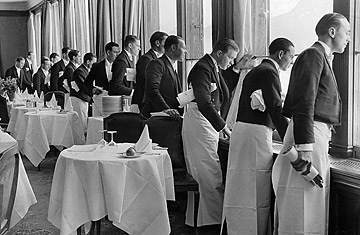
Tucked inside one of the weirdest restaurant reviews ever, amid details about a now defunct diner in Queens — with flaky owners and a waitress who accused the critic of patting her backside — is a sadly universal truth. In the September issue of GQ, Alan Richman describes how the food was so good at an obscure, outer-borough restaurant called M. Wells that he was willing to overlook the horrible service. There was a narrow window in which he was willing to do this — i.e., after waiting 45 minutes to have his table cleared between courses but before the ass-patting allegation was leveled against him a day later (an accusation, by the way, that he spends much of the review vehemently denying). But the peculiarities of this particular dining experience led Richman to ruminate on a broader trend. "Critics like me deserve some blame for the current proliferation of impossibly low service standards in so many casual New York restaurants," he writes in the review. "We tend not to censure lackadaisical conduct, thinking this is what customers want and that we would appear out of touch if we disapproved." This last part, I would submit, is one of the rarest pieces of candor I've ever read. It explains a lot about the places critics dote on and which diners are so often disappointed in.
But the dining public, especially in big cities, is just as guilty. We wear jeans to nice restaurants and gamely leave the same-size tip, whether the service is impeccable or downright insolent. When it comes to waiters, we have defined deviance down, spared the rod and made excuses for what is frankly inexcusable. In trendy restaurants staffed by young, college-educated people, there is a crippling ambivalence, I believe, about serving their social equals. And their peers feel it too. William Faulkner worked hard to get himself fired from his job at the post office, grousing that he didn't want to "have to be at the beck and call of every son of a bitch who's got two cents to buy a stamp." Likewise, what middle-class Michigan graduate, who has been eating at nice restaurants her whole life, will bend over backward to please a patron who, they both understand, could easily be reversing roles with her a month hence? Sometimes this means that the service is well intentioned but less than totally professional; other times, it verges on the pathological. What gives?
We all know what service is supposed to be like at Chicken Breast Grill or the Linoleum Diner: cheerful, efficient and impersonal. The server is a smiling face who brings you your water, takes your order, brings you your food and gets a 15% to 20% tip as a result. (If I were the nation's dining czar, I would make this mandatory. Poor tipping for any but the most egregious misdeed is a disgrace, more shameful than stealing the salt shakers.) At Chez Tweezers, where you are doted upon by an army of unctuous and servile functionaries, we understand that everything is supposed to be perfect, and we pay accordingly.
But what about this new immense class of quasi-casual, quasi-elegant bistros that have taken over the social space where we eat and date and hang out? There, the bare tables and spartan menu descriptions spell intimacy; the mom-and-pop tattooed proprietors seem to be inviting us into their home, pouring their young souls into a cascade of culin-emo earnestness. When some officious nerd comes up to your table and starts blathering endlessly about the restaurant's philosophy and how the concept of terroir informs your salad, maybe all you want is to cut him short and say, "O.K., I get it, you're really smart, but please don't make me wave you down to clear my table." The customer in an M. Wells–type restaurant, be he Richman or just some shmegegge, has been pulled more or less against his will into a relationship of equals, which often precludes the kind of attentive service many people used to expect when dining out.
But Richman is right when he says he's partly to blame for this postservice era. So am I, and all my peers, and anybody who goes to a restaurant and waits too patiently for service to get better. Much is made today about the gap between rich and poor, but this is where the gap is smallest that slights are most keenly felt. So I propose we settle the issue thus: servers will hew to certain minimal standards of professionalism and guests will commit to a minimum 15% tip. As with dancing, dating and so much else in our lives, some hard and fast rules would help a lot. Even in the outer boroughs of polite society, nobody should walk away from a meal feeling miserable.
Ozersky is a James Beard Award–winning food writer and the author of The Hamburger: A History. He is currently at work on a biography of Colonel Sanders. Taste of America, Ozersky's food column for TIME.com, appears every Wednesday.
